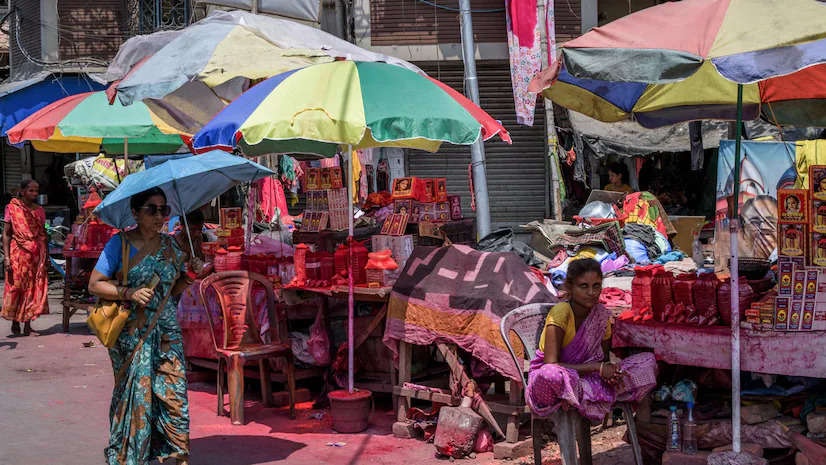
New Delhi: HeatHavoc has taken centre stage in the climate conversation in the past few months as Delhiites continue to face scorching heat, with temperatures as high as 47°C. Greenpeace India in collaboration with National Hawkers Federation revealed a report on Friday at Triveni Kala Sangam, investigating the impact of heatwaves on street vendors in the capital, thereby demanding heatwave to be declared as a national disaster.
A musical dialogue by Manzil Mystics opened the discussion on climate change and the need for community-driven measures to mitigate its impact. The compositions, inspired by Kabir Das and Mahatma Gandhi’s words, prompted the audience to sway and pledge for a climate action. The performance was followed by a panel discussion on the impact of heatwaves. “The disproportionate impact of heatwaves is a climate justice issue,” said a Greenpeace India campaigner.
‘Heat stress adds to existing challenges of the outdoor workers in Delhi’
As a part of the Climate Justice Campaign, the organisation has been mapping the affect of extreme climate events like heatwaves and the key highlights of the research reveals that 68.92 per cent vendors and outdoor workers are aware of heatwaves but only 9.56 per cent of them have heard about Delhi’s Heat Action Plan (2023). The recommendations mentioned in the report suggest that street NDMA should delcare heatwaves as a national disaster, which will ensure dedicated fund of adaptation, mitigation and relief efforts. Another recommendation was installation of drinking water stations throughout the markets and street vending areas.
Deepali Tonk, a panelist, said, “Heatwaves and heat-induced stress adds to the already existing challenges of the street vendors and outdoor workers. It impacts health, productivity and income.” Sandeep Verma, convener, National Hawkers Foundation “Street vendors are frontline workers. The disproportionate impact of heat has been observed in the last few years, but there is no mitigation strategy. The workplace of the vendor community is the street. Kisi bhi step mein, agar badhti garmi ki vajah koi kami hoti hai, toh pura system bigad jata hai. They don’t have the privilege to acknowledge the impact of heat on their health, they choose to ignore it. The impact of heat shows in dwindling number of customers, impacting the income of the vendors.” Key Highlights
- The thermal imaging technique helped in identifying hot spots at the micro-climate level. Growing thermal discomfort in Delhi is a significant public health and livelihood concern, mentions the research carried out by Dr Manoranjan Ghosh
- Irritability, headache, dehydration, sunburns, fatigue, muscle cramps and high blood pressure have been identified as common health issues among vendors. Anxiety and sleeplessness has been reported as well.
- 63 per cent of the street vendors do not take ‘work breaks’ during the day/working hours.
- Focussed group discussions with women vendors revealed that extreme heat may have resulted in delay in their menstrual cycle
721 vendors were surveyed between the first week of April and first week of May
Selomi Garnaik, a campaigner at Greenpeace India, had said earlier, “Heatwaves are becoming more intense and frequent, having severe health and economic risks, especially among the most marginalised communities. Outdoor workers are being hit the hardest. We can’t afford to ignore this disproportionate impact of heatwaves on marginalised communities. It is crucial to identify heatwaves as a national disaster and allocate sufficient funding to implement localised heatwave action plans for our cities.”
Attendees also visited the Museum of Memories, a 50-object exhibit narrating real-life stories of people caught in extreme climate events. Amruta SN, campaigner at Greenpeace India and curator of the Museum of Memories, says, “Collecting these stories was emotionally taxing , but rewarding to also encounter stories of hope and resilience.”







